by Jenny Rose | Feb 3, 2024 | Connection & Community, Emotional Intelligence
For me, February 1st is the first day of spring. I know it’s early. I like it that way. I like the anticipation, the half-intuited first stirring of life under the soil, under last year’s debris, the slow, cold wakening of seeds, stiff in their dormant shells but quickening, murmuring, “Is now the time …?”
The birds are the first harbingers for me. Here, in this place, a small city in central Maine, it’s the crows, the jays, the cardinals, and the little tufted titmice. The crows and jays complain in harsh voices of salt-encrusted pavement, tired snow over lumpy ice, the steely cold. Cardinal pairs flit in my bare, bedraggled forsythia, and visit the feeders, a startling splash of color in the grey and bone landscape.
The titmice sing. Joyful, bursting little songs of nests and eggs, of green growth and warming light. The first spears of bulbs, the budding lilac, the luscious magnolia petals are in their song, though those things are only memories and hopes in the February garden.
(As I edit this, the first goldfinch outside the window.)
(On the morning of the day I publish this, at dawn, the chickadee’s two-note spring call.)
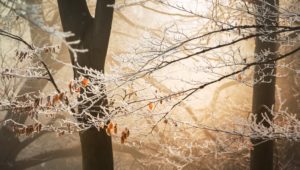
Photo by Ales Krivec on Unsplash
I have been feeling quiet. I’m burning down the last two Yule candles, gradually bringing out those of white and ivory, scented with lavender and herbs. Midwinter festivities are packed away, red table linen and warm-colored throws washed and folded for another season. I’ve been spring cleaning, making glass shine, mopping the scarred old floor, washing cupboards and doors. I walk to and from work bundled up in wool and fleece, the cleats on the bottoms of my boots clicking on the bare pavement and keeping me anchored in the ice and snow. The cold makes my eyes water, my nose run, and my ears hurt. At night, after closing the pools at 6:00, I drop a fluorescent sash around my backpack and chest and hold a small flashlight in the hand closest to the traffic, a white LED light shining ahead, a red flashing light showing from behind.
At times sleep has been thin and wrinkled this winter. In other periods of ebbing sleep I’ve felt frantic and exhausted, but this time I don’t mind. The long cold nights are restful whether I sleep or not, lying comfortable and warm in my chilly room, cocooned in linen sheets and a down comforter. I think of stars overhead, the moon on her path, ebbing and flowing, the tides lapping against the stony coast not so very far away. The hot water pipes in the radiators pop and click reassuringly.
I remember ice skating as a child, gliding smoothly over frost and snow, soaring over magically transformed water, cold biting like the crystalline sound of the sharp-edged skate blades, but warm in body from the rhythmic thrust of my legs. I haven’t skated in more than 50 years, but I remember it now, the freedom, the rhythm, the pleasure, the sense of inconsequence, as though nothing mattered, all was easy and graceful and flowing.
As the old year and winter inch over thresholds into something new, I am companioned by memories. This time last year is a constant whisper in my mind, because this time last year my mother was dying. I am not preoccupied with any time before that. After a lifetime of striving to understand and repair family history and relationships, I have surrendered to what was and what is now over. My battered empathy lies tranquil, not ravaged and torn but manageable, docile, turning over the pieces of last year with gentle intention.
In the clarity of cold winter, in my internal peace, I am alive, aware, receptive in new ways. I learned much in the last year, but intellectually. There was not time for more. The intensity of the situation, the constant crises, the long distance management, the anguish, the helplessness, the impossible tasks, the planning, demanded everything I had. I did not have time to process, to think long and deeply. I did not have the strength for it.
But now, now the past year echoes within my bones and flesh and memory. The ghosts of my feelings and experiences are miraculously without anguish, without horror, whispering a half-remembered story from childhood in which everything works out in the end. 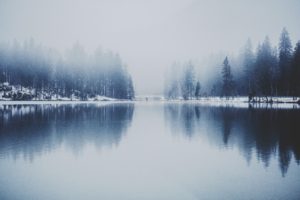
Mom herself does not haunt me. She wouldn’t come back to me in any case, but even before that thought has formed I realize she wouldn’t come back to any person. If she is in a place we can call somewhere, she’s with her animals. No one who knew her well or loved her could doubt it. She wouldn’t come back to anyone, not just me. I knew it before, but now I feel it, and the feeling is gliding, no friction, just freedom and clean, cold air. I can picture her face, laughing, joyful, with manes and tails, paws and shining coats, flopping tongues and pricked ears all around her. And I’m happy for her happiness.
A year ago I was home again after my first trip back to Colorado. I wrote on the ice, on the surface of things. I think without that I might not have stayed the course. It was my lifeline. I was surviving.
A year ago I noticed but did not feel the presence of the birds. The first weeks of Spring came and went; I was focused on the next trip to Colorado, on arranging an estate auction, on supporting my brother in finding renters for Mom’s home, on maintaining communication with Mom’s community, her caregivers, and family. I had no attention for anything but calls and texts as her condition and behavior worsened.
I was not here in April when the magnolia tree began to bloom. I did not kneel in the cold mud of the garden, rejoicing in the chilly sun as the bulbs first thrust up through the softening soil. We were dismantling Mom’s life in Colorado, reading the intimate stories of her history, her loneliness, her fear, and her private struggles. Revealing and releasing stories she never meant anyone to know, casting her life’s possessions and debris into the world, one way or another.
My brother was heroic. The community was stalwart. One step at a time, one item at a time, one mile and minute at a time, we got through it. Somehow.
Home again in May, and back to my life, but only in the motions. Some intuition kept my focus narrow, looking only at the next task, the next step. I gave myself time in the garden, time in the sun. I moved my body. I ate, and worked, and showered, and wrote, releasing my razor-sharp feelings and experience gingerly in words, like so many chips of ice. Now and then I found a moment of peace, a small oasis in between calls and texts, in between Mom’s querulous voice and caregiver check-ins, in between broken nights. But I did not try to plumb the depths of myself. I knew it was not time and I hadn’t the strength to stay safe.

Photo by Christopher Campbell on Unsplash
Summer bloomed fiercely and slowly withered as Mom did, until she was released in August.
She was released, but the work of wrapping up a life went on and on, the majority falling on my brother’s shoulders. He soldiered on. We signed and notarized papers, transferred ownership, sold the house, thought about taxes. I dealt with family jewelry and wrote an obituary, and chose a picture for the local paper.
Autumn came. On Halloween, I thought a year ago today she fell and broke her hip and it all began to end …
Winter came, and passed.
Spring is on the threshold. It feels like my first spring in this new house of ours. And now the ice begins to melt. Now I am not skating on the surface of things because the surface softens and melts, warms into depth and movement, into living water, cleansing and healing. The broken edges, the shards, blunted in the sun before melting away.
Water has ever been my strength and my safety. I take off my skates and float in my depths, my memories weightless, my ghosts drifting quietly, the echoes of the past fading away into peace as I allow them to brush against me, perhaps not for the last time – who knows? I will not be afraid if they visit me again. They are familiar now, and will melt again, as winter melts into spring.
“Ice holds memories … great islands of ice … hold many stories, but they’re just the fragments. Most of the stories are gone.”
—James Roberts at Into the Deep Woods
Questions:
- What signals spring to you?
- What intense experiences have you had to unpack slowly, over a long period of time?
- How do you manage your intense feelings?
Leave a comment below!
To read my fiction, serially published free every week, go here: 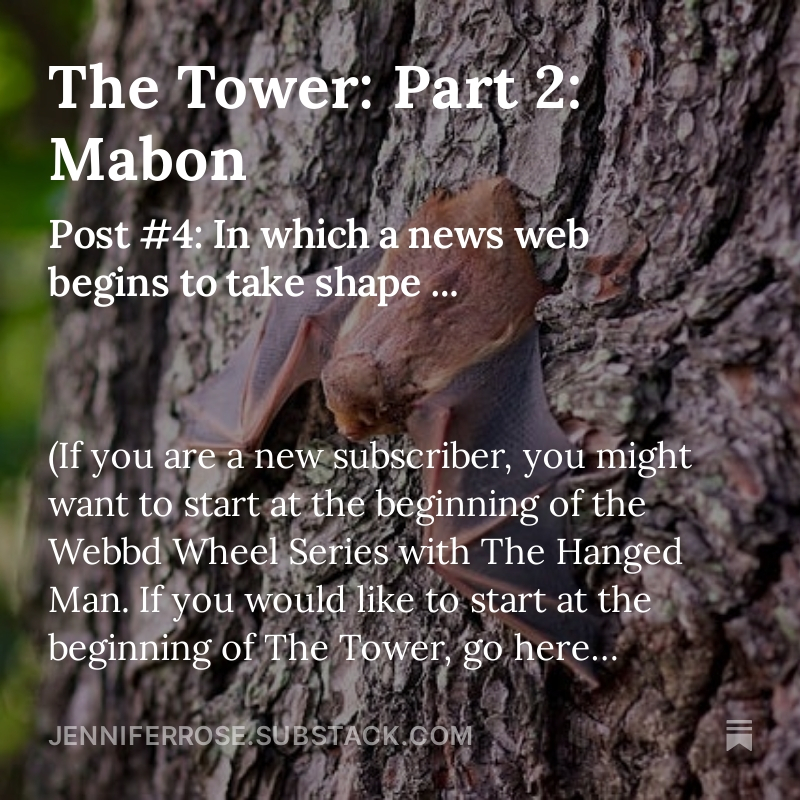
by Jenny Rose | Sep 23, 2023 | A Flourishing Woman, The Journey
Today is Mabon. My calendar informs me it’s my weekend to post on Harvesting Stones. Some weeks I’m all ready to go and need do nothing more than push the publish button. This week these are the first words I’ve written, sitting here on my little porch on Saturday morning watching the clouds tatter before the morning sun.
Mabon, or fall equinox, is the balance point during which the hours of daylight and darkness are equal. It mirrors spring equinox and falls between winter and summer solstice. Fall is my favorite time of year, and this fall I’m in the midst of profound transformation. It’s a harvest season like no other in my life.
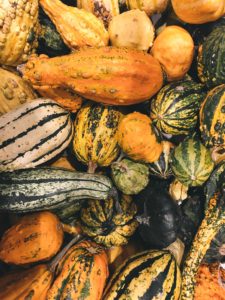
Photo by Brigitte Tohm on Unsplash
Sometimes we are so swept up in the tides of life and death we can do nothing but keep breathing. Days fall away from me, hours drift by and disappear without my awareness. I am focused on the next task, and the next. At the end of each day, I cross to-dos, questions, concerns off my lists, make notes for the next days and weeks, and fall into bed before rising at 4:30 or 5:00 to begin again.
In the midst of the chaos, I remember I choose my life. I’m getting better at just stopping.
Stopping.
I have before me a weekend. Mabon, 2023. It will never come again. A hundred tasks to do. A hundred things to worry about. A hundred choices to make.
Mabon is about balance. Action balanced with rest. Complexity balanced with simplicity. Fear balanced with confidence. Work balanced with play. Grief balanced with joy.
The light; the growing season; the summer of hospice, anguished love, extra caregivers, demented phone calls, medication lists, and, finally, my mother’s death, wane. Trees retain their leaves, but summer’s fierce green fades, bronzing, drying. Sedum and chrysanthemums bloom in the garden. A few sunflowers still flower among the ripening seed heads of their fellows.
Mabon. Balance. And I, a creature, a life among so many other lives, what can I say about it? How can I talk about balance when it feels so far from reach? How will I find balance again on the other side of transformation?
What I hold are impressions, vivid moments of mindfulness and sensuality, unexpected emotions, and the determination to cling fast to myself as autumn rip tides carry me where they will. For I am here, alive, curious, creative, awed, grateful, terrified.
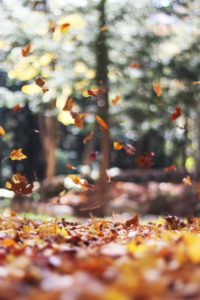
Photo by Autumn Mott on Unsplash
I’m rereading Susan Fletcher, a favorite author. I just finished Oystercatchers. On the last page, this: “You’re this: an onion bulb. The glint of a rabbit’s eye. The clicking of a beetle’s legs on a leaf; the leaf’s brown edge; dandelions; a pebble; windfall fruit.”
I read no more; I was crying too hard.
My mother is always with me. She has always been with me. My blood, my bone, my sculptor. Now, her death is with me, too, and her dying. Grief has not come to the front door, which I’ve left ajar in anticipation of its coming. It’s crawled through cracked windows, slipped through old screens long-dead cats tore with their claws. It’s drifted down the chimney, come up through gaps in my old wood floor from the cellar, crept along the copper radiator pipes, cool now, but soon to be warming.
I carry bewildered pain within me, like a ripe nut in its shell. How does it happen that a human being, intelligent, talented, competent, with so much to give, can have no feel for life? How can anyone refuse to engage with the mystery, the glory, the terror, the sweetness, and yes, even the pain of what it means to be alive, to love, to be broken and heal over and over?
Isn’t it strange that I find her in the small delights she herself would never have recognized as sustenance, as miracles? Something in Mom was too blind or too broken or perhaps too frightened to allow life to clasp her in its arms. Something. We could never talk about it. I knew it was there, but she would not reveal even the edges of her true experience.
In the end, as the fogs of dementia surrounded her, she was at last able to say she loved me. I have that, at least. And yet, she was demented … But I choose to believe.
Mabon, then, is the autumn garden. Planting blue and white grape hyacinths in drifts with daffodils under the magnolia so in spring they will bloom and naturalize as the seasons come and go. Shoveling and spreading compost mixed with aged cow manure, rich with earthworms and beetles. Pruning, trimming, prying weeds and grass out of cracks in the sidewalk and driveway. Disturbing our small brown toads as I weed and clean up debris in readiness for the blanketing fallen leaves. Dividing and transplanting. Spider webs jeweled with dew. Chilly mornings and gorgeous afternoons. The smell of my catnip, ecstatically trampled and chewed, no doubt discovered by the neighborhood black cat, Winston by name. Planting a few end-of-season sale perennials from our local greenhouse: lavender, black-eyed Susan, sedum. My garden manicure of dirt ground under my fingernails and into my cuticles, always dry and ragged from so much time in the pool. It won’t scrub away, but it will soak off in the pool during my next lesson. Peeling skin and blisters. Bruised knees.
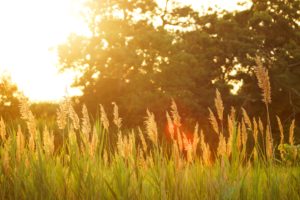
Photo by Dakota Roos on Unsplash
Mabon is the early morning mist rising from the Kennebec River three or four blocks away. It moves up from the surface of the water, along the dark, early-dawn streets and walkways, enveloping the trees, rising to hide the church spire and then gently dissolving as the sun rises while the crows call and the neighborhood rooster announces the dawn.
Mabon is the taste of Apple Pie Chai (Republic of Tea) with a dollop of half n’ half in it, as delicious as it sounds. It’s scented candles burning in the first hours of my day as I journal, make lists, think about the day ahead. Orange, red, and golden candles – orange and spice, apple and cinnamon, sandalwood. One of my closest friends says sandalwood is a “dirty hippy smell.” The thought makes me smile every time I light it. The apples and cinnamon candle sputters companionably because it has a wooden wick (Book&Reverie candles on Etsy).
Mabon is linen sheets dyed a glorious old gold on my bed, textured, heavy, luxurious. It’s socks and sneakers instead of my Keen sandals. It’s my heavy grey shirt jacket with a Buff bandana or a scarf.
Mabon. The Wheel of the Year turns. Seasons and cycles. These things remain. These things are predictable, comforting. They sustain me.
This year, Mabon is also a blizzard of what feels like endless documents, digital, paper, filed away, stacked on my desk, put into binders, stored on USB sticks. Soon, Mom’s house in Colorado will sell, the requisite paperwork will be filed for tax preparers and other legalities. Printing and scanning, FedEx drop offs, notarizing, will eventually be complete. The business of opening accounts with a new bank, obtaining new cards and checks, changing automatic payments and direct deposits, connecting to other accounts, will be finished. Insurance, retirement accounts, paying off debt – all will be managed. I will create new systems, effective and simple.
This week my nearly 20-year-old Subaru failed to pass inspection. I can’t understand it. The driver’s side door handle still works; I don’t really need the others. It drives. I don’t need AC or an audio system. I can manage without being able to open the back hatch. The heat and defrost work if I put in the fuse, and the battery is good as long as I don’t leave the fuse in when I park it. I know exactly where to bring my fist down on the hood when an ice storm seals it shut and I need to open it and put the fuse back in.
It needs $3000 of work. It’s worth $1100.
I need a new car. More tasks. More paperwork. Insurance. Registration.

Photo by Nathan Dumlao on Unsplash
These things, the documents, the tasks, the paperwork, phone calls, texts, emails, are nothing but the chrysalis of transformation. I know it. I feel stressed and overwhelmed much of the time, frustrated by delays, miscommunications, jumping through legal and bureaucratic hoops. It’s all temporary, though. It will fall away, along with the autumn leaves. The chrysalis will shred in the dark winds of late autumn and winter, this rip tide will release me, and then … something new.
Through it all is my mother. My memories of her. The pain of my love for her. I’ve inherited so much more from her than assets. There is some comfort, some strange, painful comfort, in remembering to pause. To choose. To stop. To be touched, broken open by the small daily beauties and comforts of life. The taste of creamy tea. The scent of sandalwood. The texture of rich soil. The late copper and garnet blooms of mums. The mist rising into the sun’s golden warmth. Most of all, the painful risk of loving friends, family, the world, life.
Look, Mom. See the little toad? Let’s put him here, under the rhododendron. Remind me to buy toad houses.
To read my fiction, serially published free every week, go here: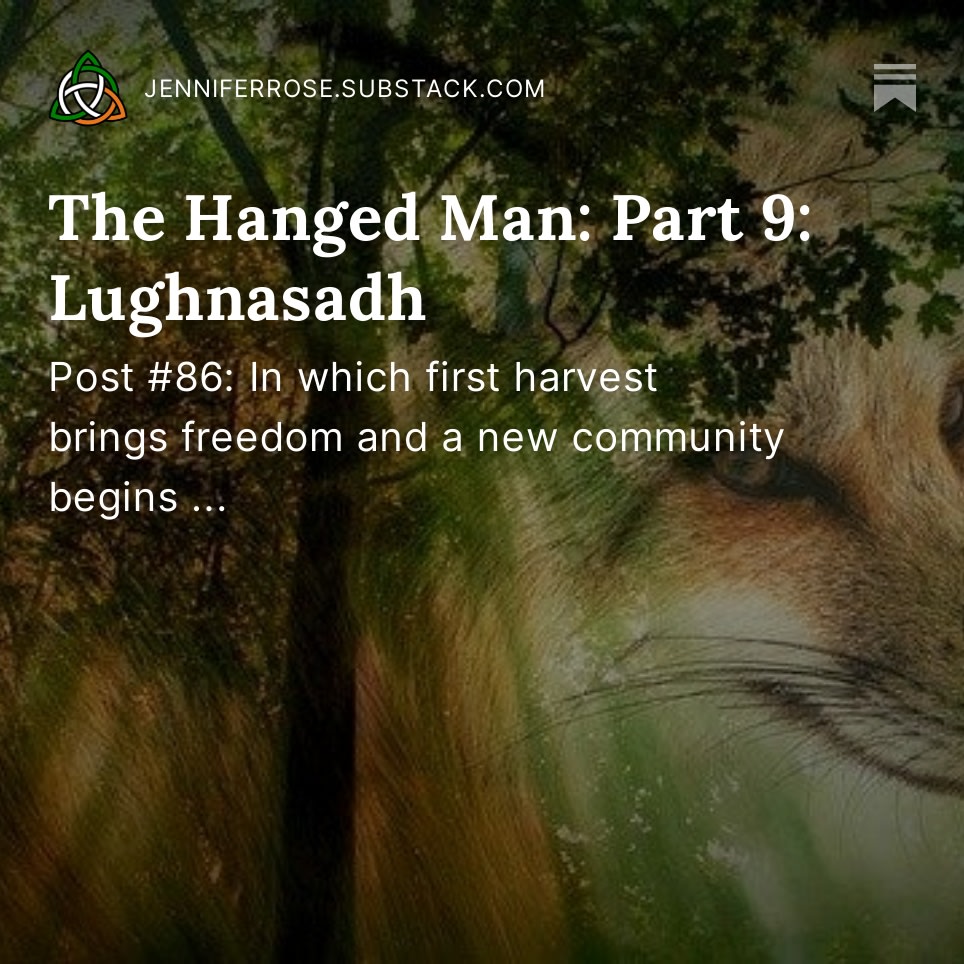
by Jenny Rose | Aug 26, 2023 | A Flourishing Woman, The Journey
Two weeks ago my 87-year-old demented mother fell in her memory care unit and broke a hip for the second time in less than a year. Eight days later she died in a hospital under the care of Hospice, my brother at her side.
Until I sat down to write this, I was afraid I had lost my words, lost the need to write them, lost the ability to form them into meaning. But I haven’t. I’m still a writer. This remains. That’s a relief.
Oh, I’ve been writing. Lists. Notes. An obituary. Texts. Updates to family and friends. Daily journaling. But it hasn’t been creative writing. It hasn’t been this blog, or my fiction. These last two weeks have passed by, the first in a blur of pity and anguish, and the second in numb relief glazed with exhaustion, and I have not posted or published. I haven’t kept track of the days; they spill into one another, as the days and nights blended together while my mother lay dying and we waited.
For a time words have simply been inadequate to relieve the pressure of my feelings in any organized or coherent way. They flew away from me, leaving a series of kaleidoscopic impressions, sensual details so vivid they frightened me with their power.
While my mother lay dying I reread my childhood copy of The Wind in the Willows by Kenneth Graham. Reading has also largely failed to sustain me during this time. I find myself unable to focus. I read a paragraph or two, and then realize I’ve been sitting staring into space, out the window or into the garden, not hearing, not seeing, not even thinking. Just sitting. But I needed a companion for the night watches, something comforting and familiar. Something innocent.
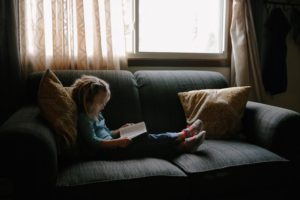
Photo by Josh Applegate on Unsplash
The fan in my window purred during those hours, blowing in cool night air and an occasional moth or mosquito. Every night, when I go to bed, I light a tea light in a candle lantern. When calls or texts reached me, I knew when I opened my eyes if it was before midnight or after, according to whether the candle still burned. Propped up on pillows, glasses on, my small bedside lamp alight, I spoke to Mom’s facility staff, emergency department doctors and nurses. I texted with my family. I read, the well-remembered illustrations making me smile as I communed with Rat, Mole, Badger, and the ridiculous Toad, finding respite for a few minutes before turning off the light and lying awake in the dark room, listening to the fan, feeling my heart beat, resting, breathing, waiting.
While my mother lay dying and after, I’ve stained wooden pallets. My partner and I are building a 3-bin compost system against the back yard fence. We set out sawhorses. I found an old brush, a rag, a stirring stick. We bought stain. I lay a pallet on the sawhorses, brush away dirt and debris, and paint every surface. The raw wood soaks in the oil-based stain, a rich brown color. The brush is more and more frazzled. I’m sloppier than I would be if painting a wall. The pallets are splintery. Some of the boards are split or loose. I bend over, the sun hot on the back of my neck and my bare arms. Mosquitos bite me. Stain drips between the boards as I brush their edges, dappling the sawhorses, falling onto the filthy old cream-colored jeans I’ve been wearing all summer in the garden, and onto my worn-out sneakers, used only for outdoor work now. As I maneuver between the boards, stain smears the skin of my hands and wrists. I kept the phone close, in a patch of shade.
This is the only sustained work I’ve been able to do. Now and then I wash a few dishes. I’ve done a couple loads of laundry. I go out into the garden, note the trimming, pruning, composting, mowing waiting to be done, and turn away. It all feels like too much. I don’t know where to start. It’s impossible to open the garden shed, get the tools, wheel out the wheelbarrow.
But the pallets. I can do that. It’s a simple task, direct. I don’t need to make any choices. Each side takes fifteen or twenty minutes. When I’ve finished a side, I wrap the brush in an old plastic bag, cover the can loosely, let the pallet dry an hour and a half in the sun. Then I turn it over and begin again. Two coats each side. One side after another.
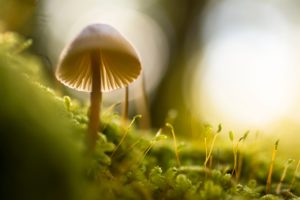
Photo by Manuel Barroso Parejo on Unsplash
The smell of stain. The prickly feeling of intense sun on my skin. I think about compost, recycling, breaking down life to sustain new life. I think of ashes to ashes and dust to dust. I wonder if I’ll ever use the compost bins without thinking of Mom. I wonder who names the colors of stain and paint. I chose ‘Canyon Brown’ for this project. I vaguely hear birds, cars passing by. Small groups of women walk by in clumps, hospital employees on their lunch break, talking about families, gardens, school starting, hospital gossip. I should be at work, on that same campus, just a ten-minute walk away. I should be, but I’m not. I’m here, staining pallets, waiting for Mom to die and then on bereavement leave.
Am I bereaved? How would I know? I wonder why I don’t care enough to follow the thought. I let it drift away.
I decide I want to make bread. I don’t eat bread often, so rarely make it any more. But my rosemary is bushy and ready to be harvested, and someone brought fresh home-grown garlic into work to share before … before all this. So I make a sponge, stirring together milk, a little sugar, yeast, water. I chop fresh rosemary and garlic, very fine. I take flour out of the freezer and let it warm. The dough is heavy under my hands, sticky at first and gradually becoming supple and smooth. The earthy smells of garlic and rosemary vanquish the smell of stain in my nostrils. I turn the dough, kneading. The timer ticks off seconds and minutes. I clean the bowl, grease it, use a linen towel to cover it for rising. I put it in the oven for safe keeping, because the cats are likely to lie on it or step in it, or nibble at it if I leave it out. The bread, like the pallets, is a project in stages. I don’t have to focus on any one step for more than a few minutes. I move between the kitchen and the back yard with my phone, not thinking, not planning, just taking the next step, and the next. I can’t remember times, so I write them down. About 90 minutes for the stain to dry. An hour for the bread to rise. Another 90 minutes for the pallet to dry. Another hour for the shaped loaves to rise. Another 90 minutes. An hour for baking.
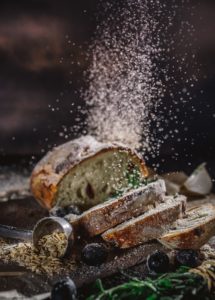
Photo by Helena Yankovska on Unsplash
At the end of the day, I have two enormous round loaves of bread to cool, slice, and put in the freezer. This batch will last me for a year. I have finished another pallet. I leave it on the sawhorses to dry overnight. My stained hands smell like garlic.
I haven’t cried since the last night call, my brother telling me Mom was gone. Perhaps I cried all my tears before she went. I receive condolences with all the grace I can muster. People talk to me about God and heaven. They talk to me about Mom. They talk to me about their own experiences of death. I try to be gracious. I try to look like I’m listening, like I’m there. With my brother and sons, my partner, I can be real. The faces of my friends comfort me. They don’t need anything from me. They don’t ask for anything. I can see their concern, their love for me, their sorrow. They hug me, and smile. They talk to me about small things, the daily things I’ve lost track of – family, friends, outings, work. I pick up a friend’s daughter and feel almost normal, doing an ordinary thing, a manageable task I cannot fail.
I realize part of my feeling of unreality is rooted in a loss of identity. I catch sight of myself in the bathroom mirror and pause. I rarely look at myself in the mirror. This woman, who is she? She isn’t the disappointing daughter any more. She can’t be, if there’s no mother to disappoint. What else is she? Who else is she? I look into my own eyes and feel no shame, no guilt. Did Mom take them with her? How will I navigate my life without them on my shoulders, without the knowledge that Mom is alone, suffering, needing? For fifty years I was at her side, day and night, year after year, ineffectual, helpless to fix or heal her physical pain, her dysfunction. Feeling my failure, my powerlessness, knowing I more often made it worse than better as time went on, even though she clung closer and closer to me as she aged. She could not release me and I almost waited too long to release myself.
But the geographical distance I put between us brought no real release. She still suffered. She declined, grew confused. Her body aged and began to run down. She was just as lonely without me as she was with me, just as emotionally remote, just as relentlessly needy. She cut herself off from me, but I still carried her. Internally, I still orbited around her. I still agonized for her.
I still loved her. I always loved her. I accepted she could not find me lovable, but it made no difference. She was my mother, and I loved her. All I ever wanted was for her to be well, and happy, but I could not make it so, and in her eyes it was my responsibility to fill her need. Indeed, she told me long ago her physical pain started with her pregnancy with me. I accepted the blame, and was heartbroken, and have tried desperately to make up for it ever since.

Photo by Nicole Mason on Unsplash
Now Death has come to stop her suffering. Has mine stopped, too? I don’t know. I’m too numb to tell. But I feel different. I feel … released. I prayed for her release and freedom, not mine, but perhaps they were linked. Many times a day I think of her, hear her voice in my head, and I realize with a painful clench of my heart she’s gone. It’s over. I can’t humiliate her anymore because of what I wear, how my hair looks, what I do, who I sleep with, or, most of all, what I write. She’s moved beyond humiliation. I can’t fail her anymore. And that’s a soaring, joyful, unbelievable thought. I can’t fail her anymore.
I wonder if I’ll finally feel good enough, if I’ll do a good enough job, live a good enough life. Might I simply enjoy my small talents, my joyful work, my community, my garden? Might I immerse myself in the loveliness of life without the gnawing guilt of knowing I’m happy when she’s not, I’m companioned when she’s not, I’m relaxed and rested and peaceful when she’s not, I’m laughing when she’s not?
The last couple of times I spoke to Mom, I told her it was okay to rest now, she could let go, be at peace. We told her her loved ones and animals were well and happy, and she could relax.
I told her, and I meant it. Was I telling myself, too?
She could not release me, yet I am released. Did Death break the chains when he gathered her in? Or now, at last, have I released myself, now that she’s moved entirely out of my power and knowledge?
As I write this, it’s Wednesday afternoon. I have finished another pallet. I have written. I have sat in the sun, read a paragraph or two at a time of an old Edna Ferber novel, rested my eyes on the garden. The lily stems are turning dry and brown, as are the leaves. Sunflowers bloom. The sun is hot. The phone has been sitting on my kitchen table all morning, silent, as I go in and out. I have balanced my checking account, scheduled a private swim lesson in a home pool, ironed a tablecloth and three napkins. Tomorrow I go back to work.
A new page of my life has turned. I can’t read it yet. It’s enough to sit with it in my lap, letting my gaze wander over blue sky and afternoon clouds, the garden, our old cars, the worn wooden boards of the porch, the bruise on my left knee, the mosquito bites on my right arm, the smears of stain on my hands. It’s too bright in the sun to read this new page, too hot, too much effort. I’ll read it later.
I dare to be at peace.
Daughter’s Dream (July 2014)
I dreamt I carried my mother.
The car had slipped out of her control
with a blind will of its own,
and I thought
I knew she shouldn’t be driving.
We landed in water.
I swam to her and held her in my arms.
Then the water was gone.
I carried my mother,
but she left my embrace,
slipping free of her embattled flesh.
Irrevocably, I felt her go.
I was alone.
I carried the vacant body of my mother.
Empty beds stood all around me
but the sheets were disordered and dank,
Smeared with shit.
I carried the vacant body of my mother.
There was no clean place to lay her down.
I carried the vacant body of my mother,
seeking to slip into my own freedom,
seeking absolution.
To read my fiction, serially published free every week, go here: 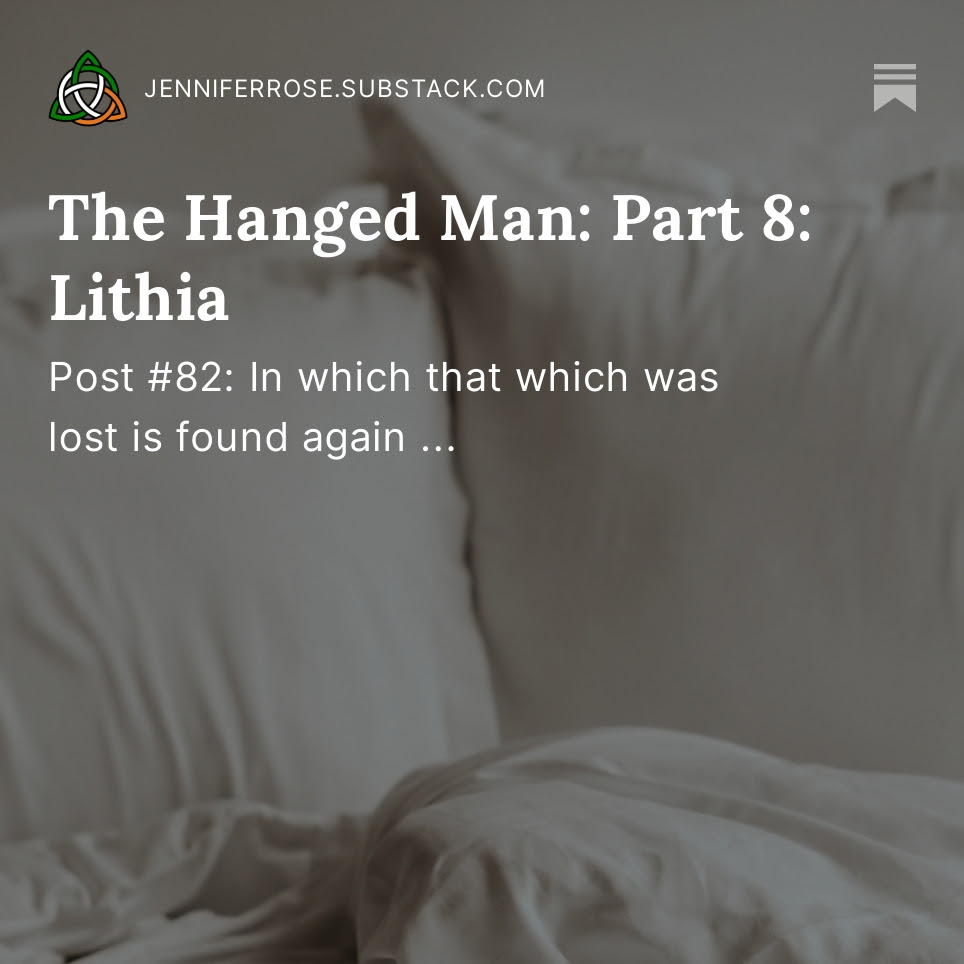
by Jenny Rose | Jun 10, 2023 | Connection & Community
I’m living inside this poem right now:
Ozymandias
I met a traveller from an antique land
Who said: “Two vast and trunkless legs of stone
Stand in the desert … Near them, on the sand,
Half sunk, a shattered visage lies, whose frown,
And wrinkled lip, and sneer of cold command,
Tell that its sculptor well those passions read
Which yet survive, stamped on these lifeless things,
The hand that mocked them, and the heart that fed:
And on the pedestal these words appear:
‘My name is Ozymandias, king of kings:
Look on my works, ye Mighty, and despair!’
Nothing beside remains. Round the decay
Of that colossal wreck, boundless and bare
The lone and level sands stretch far away.”
–Percy Bysshe Shelley
I want to escape this haunted place, walk away, never look back, forget, and wander among green trees, feeling their breath on my face. I want the blessing of the rain on my skin, to plunge my hands into rich soil, lie open to birdsong and the sun’s touch.
I want to be free.
Yet, again and again, I find myself crouching in front of that shattered visage, tracing the frown, the wrinkled lip, the sneer of cold command, unable to leave it or look away. I remember, and weep, and try to understand how something so mighty, so powerful, can fall and break apart, become nothing more than a colossal wreck in a desert in an antique land, unvisited, unremarked, nothing but time’s debris.
I was born in the shadow of those stone legs. I watched the sculptors at work, perfecting, shaping. I learned to worship Ozymandias, to make myself small before him, to endure his stony displeasure and indifference.
I did not know his name for a long time, not until I read this poem in high school. He was called Money. He was called Status. He was called Power. He was king of kings – that I never doubted. He required unceasing sacrifice; though I sacrificed everything I had, the sneer and wrinkled lip looked down upon me in infinite contempt. I looked upon his works and saw destruction and anguish. I saw lies and shattered lives and I despaired.

By Wei Gao on Unsplash
I left. I crawled away under the weight of my own inadequacy and unworthiness, across the lone and level sands, feeling his stone gaze upon me. I left, and one day I got to my feet and walked, and then I remembered how to dance, and swim, and the world opened up for me, showing me friendship, healing and joy.
Then, across the years, across the miles, Ozymandias fell, and the ground of my being has shuddered and convulsed with the impact ever since.
Understand, when he fell it all fell. Secrets lay revealed. Lies tumbled naked in the desert sun. Ozymandias, so carefully sculpted by generations before me, disintegrated. I understood then what I was taught to call Money was really named Fear. Status was in fact Shame. The wrinkled lip and sneer of cold command were not love, were never love. The king of kings lay forgotten, impotent, slowly wearing away to sand.
“Look on my works … and despair.”
It’s all gone, the gods of my childhood, the king of kings, the money, the status, the false power.
All gone.
Except for me. I am not gone.
In Maine, I eat and sleep. I journal and write. I walk to work, talk to people, laugh, teach. I sweat on the elliptical and exercise in the pools. I pay bills, make plans, file papers. I buy groceries and cat food. I do laundry and clean. I work in the garden. I’m distracted and absentminded, prone to sleeplessness and unexpected fits of tears welling from some deep unaware place. Or, on the other hand, maybe that place is all I’m truly aware of right now.
I talk and text and email to staff at the memory care center in Colorado where my mother resides, to her hospice team, to people at the agency we’ve now hired by request to provide extra caregiving. I hear about dementia, combative behavior, falls, sabotaged bed alarms, incontinence, sleeplessness, anxiety, medication adjustment. I am called to calm Mom down as though that was ever possible, as though she trusts me or ever took any comfort from me.
And part of me kneels in the desert, watching the family money (a mere pittance, judged by today’s standards rather than those of 100 years ago) and pride, that towering edifice more important than love, more important than health and happiness, more important than anything, sink into the desert like water. Is the desert powerful enough to cleanse it? Shattered Ozymandias still frowns, wrinkles his lip, sneers his cold command, but his works have disappeared even as he himself wears away.
Do I grieve or rejoice? I try to understand. I try to feel something more than despair at the waste of lives, at the dearth of love.
One thing I know: I will not stay here, beside Ozymandias. It’s a cursed place, a dark place. I will leave it to the circling vultures, the sun, the wind, and the silence. I will leave it to Time to wear away the sneer, the frown, the wrinkled lip, the trunkless legs. I left once, and I will leave again. I know this desert is a small place and the world is wide. I know who I am now. I know what love is, and that I’m capable of it. I am no longer alone.
I would have saved my family if I could have, but my gifts have no monetary value. What I have to give, what I am, cannot be bought or sold. I do not accrue a good rate of interest. I was not judged a sound investment. I did not increase my family’s status. Ozymandias, king of kings, was incapable of seeing or knowing me, being far too dazzled with his mighty works, dissolving now into sand while I myself, still vital and alive, pause to find absolution and mourn, groping for a way forward, watching it all decay.
Questions:
- What idols have fallen in your life?
- What family secrets have you discovered?
- Do you find comfort in the eventual fall of what once seemed all-powerful, or does it frighten you?
- How have you challenged your family’s definition and expectations of you?
Leave a comment below!
To read my fiction, serially published free every week, go here: 
by Jenny Rose | May 13, 2023 | Authenticity, Emotional Intelligence
I have written about dance here before. In the structure I use, the 5 Rhythms Wave by Gabrielle Roth, chaos is part of the wave. The music for chaos is fast but grounded. Think Pink Floyd’s Meddle.
As I lingered on the threshold between waking and sleep this morning, thinking about loss, the subject of my last post; thinking about my distressing inability to publish my usual essay on Substack last week, and thinking about the ways in which I’m reshaping my beliefs about my family and therefore myself, I recognized the chaos part of the dance.
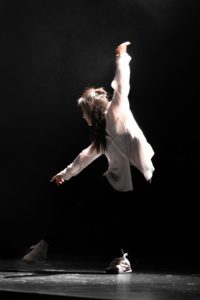
Photo by Leon Liu on Unsplash
To dance in chaos involves letting everything go except the beat. Chaos is about strength, not beauty. It’s about grounding and staying grounded even as the music flings us through space.
Chaos is the part where you dance till you drool.
The edge of chaos is fertile, regenerative, thick with possibility. It’s also powerfully disorganized and unpredictable. It’s exhausting, overwhelming. Too much is happening too fast. When dancing chaos, we give ourselves entirely to the music and follow it through the tumult however we can. As Margaret Shepherd said, “Sometimes your only available transportation is a leap of faith.” Add music to that idea and you have the chaos part of the dance. The car has broken down. The planes are grounded. The train has derailed. The illusion we’re in control has shattered. Our routines and schedules fall apart around us. Our internal and external worlds begin to reshape in ways we can’t understand.
I’ve been troubled in the last couple of weeks by the violence of my rebellion against doing anything except work and play in the garden. I don’t want to write. I don’t want to think or reason. I don’t care about the damn housework. Beltane, May 1st, came and went without my usual ritual and practices. I don’t want to be brave, strong, organized, compassionate, tolerant, empathetic, or responsible.
I can’t remember a time in my life when I’ve shut down like this. I’m unable to guilt or lash myself into being “productive.” I feel ashamed and scared. I don’t recognize myself.
It occurs to me this is my Beltane ritual this year. After all, Beltane is about fertility. Physical fertility, the cyclical fertility of the growing season, creative fertility. My ritual this year is being in the garden. There, with my knees in the dirt, the smell and feel of the soil, the texture of new weeds and old leaves and matted grass (we didn’t have a mower last year), I am peaceful. I know where I am. I am, literally, grounded. I don’t have my phone. Nobody needs anything from me. I bend, kneel, stoop, dig, rake and shovel compost mindlessly. I dream vaguely about new garden beds, rewilding with native shrubs and trees. Black flies come for their drop of blood. The sun shines down on me.
Right now I need to be in the garden. I don’t understand it entirely, but perhaps there’s no need to. What I do know is something in me refuses to engage with anything else. As the lilies and iris emerge, as the tulips bloom and the daffodils fade, as the lilacs bud and the magnolia blossoms fall and cover the ground, I mulch and prune and feel seismic forces beyond my control reshape me internally.

Photo by Kelly Sikkema on Unsplash
So much of what I’ve learned and believed about my family and my place in it has crumbled into dust. Old family myths have exploded with fragments of evidence from Mom’s life, unearthed in the process of selling her estate. I didn’t entirely believe in some of those myths, but they were stable. They provided a family background I was familiar with. I built an identity from the identities family members who came before me created. If I am not the despised one, the broken one, the one who doesn’t belong, the cuckoo in the nest, who am I? Has all that been yet another family myth? Has any of it ever been about who I really am or my personal value, or have I been nothing but a faceless, nameless piece in a dysfunctional family pattern?
I long for freedom. Is this the beginning of freedom?
My recent inability to force myself to take care of business, to be responsible, consistent, and productive, is terrifying. I’ve always pushed myself through any resistance or fatigue. I’ve always known I must justify my existence with constant production, pleasing, and caregiving.
Am I free of that now? If I don’t have to justify my existence because that belief is a lie based on family mythology that’s at least part lies, is that freedom? Am I brave enough to take my freedom, walk away from all the burdens (too heavy for me, but I’ve carried them anyway), and simply choose what makes me happy? I have stood at this crossroad before.
Two weeks ago I wrote about loss. Now I’m watching glimmers of new beginnings, nebulous glints of what might come into the disturbed ground of my being. I pick up trash and find rich soil beneath it. I dig up dandelions and burdocks and discover little patches of old garden. The sun touches me without asking for anything in return. I rake away last year’s debris and mix it with compost to build new garden beds. This morning, the crab apple is in bloom. The tight buds on the white lilac by the porch door gather perfume.
Meanwhile, back in Colorado, strangers live in my mother’s house. Hospice tells me Mom can no longer ambulate independently, even with her walker. A call in the middle of last night reported yet another fall, as she doesn’t realize (or won’t admit) her own weakness. Appraisal revealed my wealthy and powerful grandmother’s gold, pearls, and gemstones were mostly costume, not real. A ladylike façade. A denial of her impoverished roots. A glimpse of shame and fear that rival my own, though I never knew they were there.
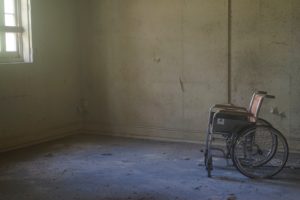
Photo by Doug Maloney on Unsplash
It’s Mother’s Day weekend. A friend asked me yesterday how I felt about that, and I had no words.
What is real? What can I bear? The dirt on my knees, under my fingernails. The spectacularly itchy, burning welts of black fly bites. The egg shells, banana peels, and soggy segments of lemon in the compost pile. The lovely cupped double tulips I planted last fall, white, pink and purple. The thumb-sized bumble bee tumbling ecstatically among the pink blossoms of the crabapple. My own breath, heartbeat, sweat. The sun on my skin.
Gardens are made and remade. They die and are reborn. They go wild and survive until rediscovered. They adjust, adapt, take advantage of the edge of chaos according to their own wisdom and purpose.
For now, I’m in the garden, dancing with chaos, nurturing new life, hanging on.
Questions:
- What is your experience of Mother’s Day?
- In the times during which you struggle to manage your life, are you fearful or do you allow yourself to follow your needs?
- Do you find chaos joyful and exhilarating or frightening?
- What opportunities have you had to reframe your family?
Leave a comment below!
To read my fiction, serially published free every week, go here: 



















